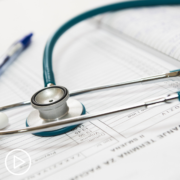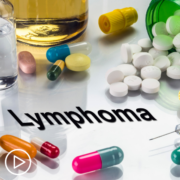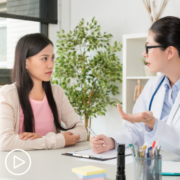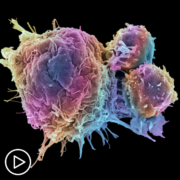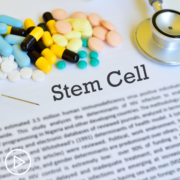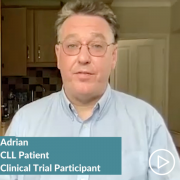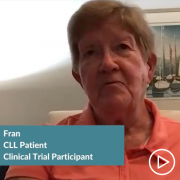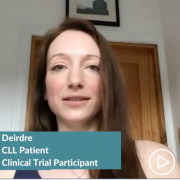Chronic Lymphocytic Leukemia: Shirley’s Clinical Trial Profile from Patient Empowerment Network on Vimeo.
Chronic lymphocytic leukemia (CLL) patient Shirley felt she had a different experience not fitting the typical CLL patient demographic. Watch as she shares about her journey as a BIPOC patient, the value of clinical trials, and her advice to other patients for ensuring optimal outcomes.
See More from Patient-to-Patient Diverse CLL Clinical Trial Profiles
Related Programs:
Transcript:
Shirley:
In my late 30s, I started feeling extremely fatigued, and I went to my GYN. She ran a couple of tests, and she has sent me over to a hematologist because she just determined that it was something that she was not knowledgeable about. Then I had a physician contact me after several blood tests, and they had told me that it was a form of cancer, and it was leukemia, and it was called CLL, which is chronic lymphocytic leukemia.
When I heard the word chronic, I immediately thought, “Oh my God, this means like death instantly.” But they had told me that, “No, it was aggressive, but it’s definitely slow-moving,” and I have a great chance of fighting it. I was concerned because I did not feel like I wanted to be a lab rat, because I was told that I did not fit the demographics for having CLL. Most of the individuals were male of Caucasian descent, and they were much, much older than I was possibly in the late 60 to 70s, so I got a lot of stares and it made me feel very uncomfortable. So, I just didn’t want to feel like they were just like, “Okay, this is a different case. We can make a name for.” I wanted to make sure I was getting the best treatment.
I didn’t tell too many people in the beginning because I really didn’t know what was going on, but a lot of people was able to tell because no matter how much the time of sleep I got…I was always tired. The fatigue is just overwhelming. I decided to just remain optimistic about my future, because I know whenever you’re trying to battle any kind of ailment your attitude means a lot, you have to really put it out there into existence that you’re going to get better and you believe it, you have to really believe it in order to put that energy into finding out about the treatments and so forth. My doctors, they gave me a booklet that was maybe about it, and they said to me, “Take this home, study hematology and learn about your disease, how we’re going to be trying to treat it, and you know what you’re going to be feeling and you need to tell us everything if your nose itches, your eyes burn. We need to know everything that happens.”
And I was just not a complaining type of person, so there were plenty of times where I was experiencing like pain on my side and I was just like, “Oh, it’s probably just gas from the medication,” and then later found out that the medication they were giving me was enlarging my spleen, so it was pushing against my stomach, which was causing me an enormous amount of discomfort. So the doctors had to then give me other types of medication to help treat that issue that I was having, so it was definitely a long journey. This was an unusual diagnosis for someone of my heritage. The doctors explained to me that there was no blueprint for my treatment, this was, they were going to be trying things, they had a team of individuals, maybe it was like 10 or 15 of them, and they’re actually studying my case on this big screen in this room.
So it was constant medication, it was constant them trying, running the blood test, you were always, always getting blood tests, they were always giving you observations. Someone was always in your room, at least every two hours, checking to see what was going on. I just remember some time sitting in the hospital was just feeling very overwhelmed and definitely feeling isolated alone. I remember one time I was in so much pain, like my bones were hurting me so bad that I literally was just losing my mind in the bed. So they gave me some morphine, which I’ve never taken before in my life, and I wind up throwing up the chemo medication that they gave me. it was just so bad. So, the nurses and I were really overwhelmed at that point. I remember contacting family members and telling them, “I need to get out of here, I feel like they’re just trying whatever they want to try on me, and I don’t think it’s working. I don’t feel this is the place for me, like I need to really get out of here.”
So my doctor who was actually giving a seminar in Switzerland was just like…he was really amazing. He said to me, he said, “You are my prize patient. I am working every day really hard trying to get you back to being your 100 percent yourself,” He said, “You’re always like a light of sunshine.” The women that he worked with are always looking in the patient portal, and they’re like, “Shirley is coming in,” like, “Oh my gosh, she’s coming today.” And they’re excited because I always maintained a great attitude, and I always came in there dressed up.
So my doctor also recommended it when my treatment, a hospital stay was over for me to practice on taking out walks and exercising, yoga was very good meditation, they told me to get all these apps on my phone and therapeutic massages, those have been like a savior for me. I think having a good support system around you is extremely important, people who understand. Never be afraid to tell people what exactly you are experiencing. The mental fatigue that you go through is really unpredictable, and it’s off because that was not something that they, that no one prepared you for. So my doctor and his colleagues, they were just one of the greatest teams that I have experienced, them being very transparent about what was going on with me, even when I was at one time being very stubborn, I got so upset that I pulled the IV out of my arm and I was like, “You know what, I’m not doing this, I’m tired. I’ve got to get out of this hospital. I can’t stay here.”
I mean, people were just so sick, and this is not me. And they had to assure me, “It is you. You are sick, and you do have a blood cancer, and the sooner you come to terms with that, the more calm you’re going to be in being susceptible to accepting treatment. We’re here to help you, but we need you to tell us if something is not working, you don’t feel good on what’s going on in your body, we need to know.” The blood tests don’t lie, they tell them exactly what’s happening, the doctors know if the treatment is working, they monitor the CLL extremely closely. They were way more advanced at honing in on the type of treatment that I needed, so I was really assured that you’re in the right hands, and after when I started feeling a little bit better, then my trust totally opened up in staff, because I saw that they were excited about my treatment working. They were giving me the three combinations of chemo, and they were like, “This combination is working for you now.”
They started a new trial which was bringing in venetoclax (Venclexta) along with the rituximab (Rituxan), and that is what really started sending me on a better path, getting better. And then once I came off of the rituximab, which was an IV-infused chemo treatment, they decided to just keep me on the pill form of venetoclax, I was able to go into the office, which I was ecstatic about.
Advice I like to give to patients who are considering a clinical trial is definitely ask a lot of questions. Don’t be afraid, don’t be shy or hesitant and don’t feel like you feel like you’re ignorant. And always address it with a positive attitude. Keep in mind that they are there for your best interests and trying to get your health back to normalcy. Just know that you’re not in it alone. And always find someone that you can always have a conversation with if you don’t feel comfortable. Never be afraid to ask questions and just even if you do look different as opposed to everyone else that… and just get that everyone else that is sick. Don’t feel like you’re in it alone, regardless of how you look for what your demographic background is, just know that the team that’s there that’s in place is always fighting for you, and you can always say no or get a second opinion. That’s very important to know that you have options.
So, never feel afraid to ask about the clinical trials and do your research, it’s important. It’s inspiring to see people on the leukemia organization website that are exercising, they go for runs right after they receive treatment, that inspired me to say, I’m going to out and take the dog out for a walk or go out for a run and help myself get better,” and it works. It works, it really does.


